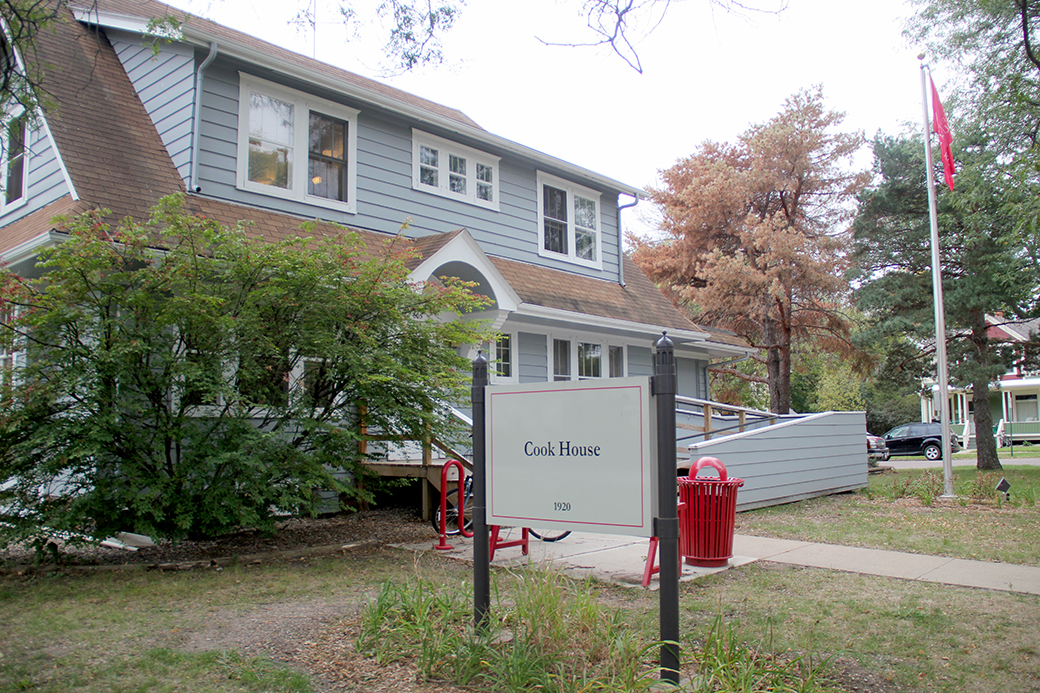
Counseling center, student organization work to ease mental health struggles
With tests, relationship issues and the stress of college life, sometimes students need someone to talk to. That’s where the Cook House and Lost & Found come in.
The Cook House is the on-campus counseling center for registered university students. Students are able to meet with counselors for free any day of the week.
The University of South Dakota’s Lost & Found is a group on campus that focuses on suicide prevention and awareness. Together with the Cook House, they provide students with the mental help they need.
Logan Anderson, a junior and the president of the Lost & Found, said the group also tends to students who may need help finding the Cook House and gives them the boost of encouragement to get there. The Lost & Found campus group has around 15-20 members.
“Really, we’re the people to come to if you have a problem,” Anderson said. “They can come to us and talk to us.”
Anderson said mental health is something a lot a people don’t understand and there’s a stigma that any person with mental health problems is crazy.
“No one likes to be different,” he said.
Some offerings for students at the Cook House include personal and group counseling, addiction counseling and mental health counseling.
“It’s neat to meet the students to see where they are,” said Michelle Turner, a prevention counselor for the Cook House.
Turner said that on a college campus, mental health should be addressed mostly because of the inevitable stress many students have.
“Stress is the biggest thing,” she said. “College campuses breed it. Stress is one of those things that can lead to anxiety and depression.”
Kim Grieve, dean of students and vice president of Student Services, said the counseling center is a great place for students to go to and that mental health is important to discuss on a college campus.
“Mental health is important to discuss on campus to make sure students are safe and healthy,” Grieve said. “Education is the key to understanding mental health issues.”
The counselors at Cook House also help students with eating disorders, anxiety, depression, relationship and communication concerns, anger issues and sometimes self harm. Despite the problems she sees, Turner said she loves working for the Cook House and giving students the sense of getting on the road to recovery.
“It’s a wonderful place to work,” Turner said. “I feel grateful and blessed to even be here. We’ll only grow to fit the need.”
In her three or four years of working at the Cook House, Turner has seen a lot of progress with her clients, and feels it is the most rewarding part of her job.
“That’s what makes it kind of exciting,” Turner said. “I think sometimes we hope that any intervention we do is going to be helpful, and so, when you actually see the progression, it’s very validating.”
The Cook House, despite the lack of counselors, meets with many students.
Turner said the Cook House handles a case load of as many as 170 students in a single week with only four or five counselors.
Anderson said the Cook House has also helped him tremendously, because the counselors there are “unbiased” and have “professional answers.”
Lost & Found also allows students to feel a sense of welcome on campus, and that despite any problems they may have, the support is always there.
“It’s normal for people to have problems,” he said. “Mental health is there and not something that’s going to go away.”
The Lost and Found meets the first Tuesdays of every month at 5 p.m. in Beacom room 206, and the Cook House is open Monday-Friday, 8 a.m. to 5 p.m.

